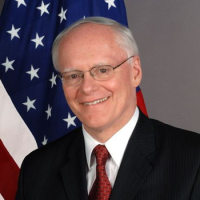Israel-Hamas War: Senior Diplomats Assess the Next Phase and Regional Impacts
In today's discussion, distinguished senior diplomats provided valuable insights into the ongoing Israel-Hamas conflict. The situation is dire, with a significant increase in airstrikes and a worsening humanitarian crisis in Gaza. Simultaneously, the Israeli military is signaling preparations for a full-scale invasion. Against this backdrop, the US military has initiated airstrikes on locations in eastern Syria associated with Iran's Revolutionary Guard Corps. This discussion also addresses the growing involvement of external actors, such as Iran-backed Hezbollah in Lebanon.
Iran’s Regional Ambitions and Nuclear Diplomacy:
Baroness Catherine Ashton highlighted the assertive role of Iran in the region under President Raisi’s leadership. She pointed out the disappearance or freeze of U.S.-Iran nuclear discussions, signaling potential challenges in diplomatic relations. Ashton suggested that Iran, considering itself a major force in the region, intervenes strategically in regional conflicts as it deems appropriate. The discussion centered on the intricate balance between Iran’s regional ambitions, particularly in relation to the conflict between Hamas and Israel.
Military Challenges and Strategic Responses:
Ambassador James Jeffries delved into the military intricacies surrounding the conflict. He touched on the strained Israeli-Turkish relationship, driven by President Erdogan’s pro-Palestinian stance. Jeffries discussed the broader regional dynamics, emphasizing Saudi Arabia’s desire for Israel to defeat Hamas as a means to counter Iranian influence. The military aspect took center stage as Jeffries argued for a decisive military solution, drawing parallels with Israel’s historical success in deterring Hezbollah for 17 years since the end of the 2006 Lebanon War. The theme revolved around navigating complex military challenges and formulating strategic responses to address the multifaceted conflict.
Diplomacy, Global Engagement, and Public Sentiment:
Both panelists acknowledged the importance of diplomatic efforts and global engagement in resolving the conflict. Although she didn’t see any long-term solution being brokered anytime soon, Baroness Catherine Ashton emphasized the need for international collaboration, pointing out Secretary Blinken’s coordination with European partners. She highlighted the significance of civilian and popular sentiment globally, noting the widespread desire for a long-term deal between Israelis and Palestinians. Ambassador Jeffries underscored the U.S. commitment to its global security network, framing the situation as a demonstration of solidarity with allies like Israel, Ukraine, and Taiwan. The theme encapsulated the diplomatic initiatives underway and the broader global context, emphasizing the influence of public sentiment on decision-making.
Speakers


Former ambassador to Iraq and Turkey, and Special Envoy to the Global Coalition To Defeat ISIS

Former Vice President of the European Commission and former High Representative of the EU for Foreign Affairs and Security Policy
Hosted By

Middle East Program
The Wilson Center’s Middle East Program serves as a crucial resource for the policymaking community and beyond, providing analyses and research that helps inform US foreign policymaking, stimulates public debate, and expands knowledge about issues in the wider Middle East and North Africa (MENA) region. Read more
